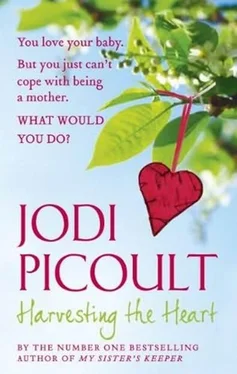Part II: Growth Summer 1993
Paige
The thick sateen curtains at Ruby’s House of Fate blocked out The hot midday sun. Ruby herself, a mountain of copper flesh, the hot midday sun. Ruby herself, a mountain of copper flesh, sat across from me. She held my hands in her own. Her cheeks reddened, her chins trembled. Suddenly her thick eyelids opened, to reveal startling green eyes that had, just minutes before, been brown. “Girl,” Ruby said, “yo’ future is yo’ past.”
I had come to Ruby’s House of Fate out of hunger. Driving all day away from Cambridge had brought me to Pennsylvania-to Amish country. For a time I had parked the car and watched the neat black buggies, the fresh-capped girls. Something told me to keep on driving, in spite of the burning in the pit of my stomach. I hadn’t eaten since breakfast, and it was now almost eight o’clock at night. So I had continued west, and at the outskirts of Lancaster I discovered Ruby. Her little row house was marked by a big billboard in the shape of a palm, covered with glittering moons and gold stars. RUBY’S HOUSE OF FATE, the sign read. YOUR PLACE TO FIND ANSWERS.
I wasn’t certain what my questions were, but that didn’t seem important. I wasn’t a believer in astrology, but that also seemed to be beside the point. Ruby answered the door as if she had been expecting me. I was confused. What was a black woman doing reading fortunes in Amish country? “You’d be amazed,” she said, as if I had spoken aloud. “So many people pass through.”
Ruby did not tear her green eyes from mine. I had been driving aimlessly all day, but at Ruby’s words I suddenly realized where I was headed. “I’m going to Chicago?” I asked softly, for confirmation, and Ruby grinned.
I tried to pull away from her grasp, but she held fast to my hand. She rubbed her smooth thumb over my palm and spoke quietly in a language I did not understand. “You’ll find her,” she said, “but she isn’t what you think she is.”
“Who?” I asked, although I knew she meant my mother.
“Sometimes,” she said, “bad blood skips a generation.”
I waited for her to explain, but she released my hand and cleared her throat. “That’ll be twenty-five,” she said, and I rummaged through my purse. Ruby walked me outside, and I swung open the hot, heavy door of the car. “You need to call him too,” she said, and by the time I looked up at her, she was gone.

“Nicholas?” I pulled at the collar of my shirt and ran my fingers over the smooth silk scarf from Astrid, trying to escape the phone booth’s heat.
“My God, Paige. Are you hurt? I called the supermarket-I called six of them, because I didn’t know where you’d gone, and I tried the nearest gas stations. Was y g Pgn=there an accident?”
“Not really,” I said, and I heard Nicholas draw in his breath. “How’s the baby?” I asked, feeling tears prick the back of my throat. It was strange; for almost three months, all I’d thought about was getting away from Max, and now I couldn’t stop thinking about him. He was always in the corner of my mind, clouding my vision, his gummy fists reaching toward me. I actually missed him.
“The baby’s fine. Where are you? When are you coming home?”
I took a deep breath. “I’m in Lancaster, Pennsylvania.”
“You’re where?” In the background, I heard Max start to cry, and then the sounds became louder, so I knew Nicholas was jiggling the baby in his arms.
“I was headed to the Stop & Shop, and I kind of kept going. I just need a little time-”
“Well, hey, Paige, so does the rest of the free world, but we don’t just up and run away!” Nicholas was yelling; I held the receiver away from my ear. “Let me get this straight,” he said, “you left us on purpose?”
“I didn’t run away,” I insisted. “I’m coming back.”
“When?” Nicholas demanded. “I have a life, you know. I have a job to get back to.”
I closed my eyes and leaned my head against the glass of the phone booth. “I have a life too.”
Nicholas did not answer, and for a moment I thought he’d hung up, but then I heard Max babbling in the background. “Your life,” Nicholas said, “is right here. Not in Lancaster, Pennsylvania.”
What I wanted to tell him was: I’m not ready to be a mother. I can’t even be your wife, not until I patch together the pieces of my own life and fill in all the holes. I will come home, and we’ll pick up where we left off. I won’t forget you; I love you. But what I said to Nicholas was: “I’ll be back soon.”
Nicholas’s voice was hoarse and low. “Don’t bother,” he said, and he slammed down the phone.

I drove all night and all day, and by 4:00 P.M. I was on the Loop, heading into Chicago. Knowing that my father wouldn’t be home for a couple of hours, I headed toward the old art supply store I used to go to. It felt strange driving through the city. When I had been here last, I had no car; I had always been escorted. At a stoplight I thought about Jake-the angles of his face and the rhythm of his breathing. Once, that was all it had taken to make him appear. I drove carefully when the light turned green, expecting him to be on the next street corner, but I was mistaken. That telepathy had been severed years ago by Jake, who knew we could never go back.
The owner of the art store was Indian, with the smooth brown skin of an onion. He recognized me right away. “Missy O’Toole,” he said, fy"Ñ€ghthis voice running over my name like a river. “What can I get for you?” He clasped his hands in front of himself, as if I had last stepped into the store a day or two before. I did not answer him at first. I walked to the carved statues of Vishnu and Ganesh, running my fingers over the cool stone elephant’s head. “I’ll need some conté sticks,” I whispered, “a newsprint pad, and charcoal.” The words came so easily, I might as well have been seventeen again.
He brought me what I had asked for and held out the conté sticks for my approval. I took them into my palm as reverently as I’d taken the Host at Communion. What if I couldn’t do it anymore? It had been years since I’d drawn anything substantial.
“I wonder,” I said to the man, “if maybe you would let me draw you.”
Pleased, the man settled himself between the Hindu sculptures of the Preserver of Life and the God of Good Fortune. “What better place for me to be sitting myself,” he chattered. “If you please, missy, this place would be very good, very good indeed.”
I swallowed hard and picked up the newsprint pad. With hesitant lines I drew the oval of the man’s face, the fierce glitter of his eyes. I used a white conté stick for relief shading, creating a fine web of wrinkles at his temples and his chin. I mapped the age of his smile and the slight swell of his pride. When I finished, I stepped away from the pad and observed it critically. I was a little off on the likeness, but it was good enough for a first try. I peered into the background and the shadows of his face, expecting to see one of my hidden pictures, but there was nothing except for the calm brush of charcoal. Maybe I had lost my other talent, and I thought that this might not be so bad.
“Missy, you have finished? You do not want to keep such work all to yourself.” The man scurried toward me and beamed at my sketch. “You will leave it here for me, yes?”
I nodded. “You can have it. Thank you.”
Читать дальше














